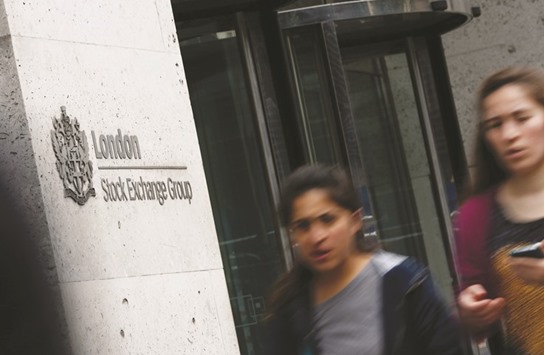Shares in Samsung Electronics tumbled yesterday after the company junked its Note 7 smartphone, while the anaemic pound helped push Britain’s stock market to a record high.
The weak pound, flailing in the wake of Britain’s June vote to quit the European Union, helped push London’s FTSE 100 index of top blue-chip companies to 7,129.83 points, beating the previous record high set on April 27, 2015, before profit-taking set in to push the index lower at the close.
A weak pound helps British exporters, and also boosts profits when foreign currency earnings are converted back into sterling.
“A large proportion of FTSE 100 company profits are generated abroad. The weak pound therefore boosts earnings in sterling terms,” Oanda analyst Craig Erlam told AFP.
The pound has lost nearly 18% since British voters narrowly approved Brexit in a referendum.
Energy companies got an early lift from a higher oil price, which soared Monday in response to comments from President Vladimir Putin that Moscow was ready to align with Opec’s push to limit output and address a supply glut.
But the International Energy Agency warned yesterday that the glut may weigh on world markets deep into next year – unless the Opec producers make good on its promise to cut output.
Oil slipped after the IEA also said that Opec and others are pumping petroleum at record levels, and it cut its forecast for world oil demand for this year.
As oil turned lower, so did stock markets.
The day’s big corporate story was Samsung after the tech giant told customers to stop using their Galaxy Note 7 devices and called a halt to worldwide sales as US officials warned the handsets could blow up.
Stock in the world’s biggest smartphone maker tumbled 8%, sending the overall Seoul stock market sliding more than 1%.
The group halted production yesterday and then announced it was scrapping the model, once markets had shut in Asia. Samsung advised consumers with Note 7s to power down and stop using them.
The announcement came a little over a month after Samsung announced a recall of 2.5mn Note 7s in 10 markets following complaints that its lithium-ion battery exploded while charging.
“The group’s flagship handset has turned out to be worse than a dud – it is a dangerous fire risk,” City Index analyst Ken Odeluga told AFP.
“This incendiary effect has spread to Samsung’s shares.”
Odeluga added that Samsung had a big impact on sentiment because of its huge market capitalisation of more than $200bn (€179bn).
“If Samsung catches a cold, so do the region’s equities.”
The crisis has turned into a PR disaster for the company and the situation only worsened when reports emerged a week ago of replacement phones also catching fire.
“The loss of sales from the Galaxy Note is only the tip of the iceberg,” warned CMC markets analyst Jasper Lawler. “Demand for the flagship Galaxy S8, scheduled for release early next year, could be severely impeded by the loss of consumer confidence in the Samsung brand.”
Analysts said fierce rivals like US giant Apple – the second biggest smartphone maker – and challengers such as China’s Huawei would benefit in the short term.
Apple shares duly jumped in New York, but the rest of Wall Street was dismayed when Alcoa opened the earnings season by missing analysts’ expectations, prompting a sharp slide in the aluminium company’s share price.

The weak pound, flailing in the wake of Britain’s June vote to quit the European Union, helped push London’s FTSE 100 index of top blue-chip companies to 7,129.83 points, beating the previous record high set on April 27, 2015, before profit-taking set in to push the index lower at the close.
